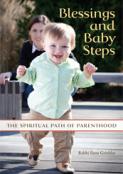- Home
- Play & Learn Home
- Online Enrichment
- Experience Modern Israel
- Israel It's Complicated
- Jewish and Me
- Jewish Holidays Jewish Values
- Jewish Values in Genesis and Jewish Values in Exodus
- Min Ha’aretz
- Our Place in the Universe
- Simply Seder
- The Prophets: Speaking Out for Justice
- Making T'filah Meaningful
- Make, Create, Celebrate
- Yom Haatzmaut Resources
- Hebrew Apps
- About The OLC
- What is the OLC?
- Introduction
- Get Started
- Resources
- OLC Content
- Parent Materials
- See My OLC Classes
- Store
What Do Jewish Families Want?
Written by Behrman House Staff, 18 of February, 2013
A Different Approach to Teaching about Passover
8 Essential Questions to Guide Students to an Enduring Understanding of Jewish Values
Affordable, Adorable Family Machzor
How do we involve families in meaningful ways? This is a challenge cited by educators across the country as one of their most frustrating. Families are busy. Parents may not feel comfortable with their level of Jewish knowledge or Hebrew. The pull of everyday secular demands—work, school, community activities, sports—may leave families feeling that the “Jewish” part of life is disconnected from the rest. There is a drop-off mentality around school.
And yet, our families have made a voluntary commitment. They have joined a congregation and school. They commit their children, their time, and their money to this enterprise. What do families want?
Behrman House asked. In a survey reaching out to over 12,000 Jewishly connected families, respondents indicated a desire for community, closeness, knowledge, involvement, interaction, and enthusiasm. Interestingly, although 84% of our respondents said they are synagogue members, they don’t always rely on their congregations when they have questions about Judaism. When families seek information about Judaism, they report first consulting other family members, books & periodicals, and Jewish websites before reaching out to rabbis and religious school personnel.
Families are a diverse group, who want individual attention and to be met where they are at this moment. “I’d like help for someone like me, starting from scratch as an adult,” says one, while another writes “Everything seems so basic . . .there is little beyond the Judaism 101 stuff.” And, while over 60% rated themselves as very or extremely satisfied with their families’ level of Jewish engagement, 20% reported one parent who doesn’t identify as Jewish.
In a recent online discussion on the Behrman House Facebook page, our educator colleagues have shared their insights, especially about helping families integrate their Jewish selves with the rest of their lives. Kerry Olitzky suggests that Jewish education needs to be family based, and supplement what is taking place at home with a family systems approach. Interfaith family.com and others seek to integrate Jewish practice into everyday family life, and help families prepare for lifecycle events. For Iris Koller, “Family learning becomes based in how Judaism helps guide our everyday lives . . . . We can start by putting the Jewish words and perspective (and texts) to the things they are trying to teach their children.”
So what guidelines can we use to create programs that meet and support families where they are in their lives, their Jewish home practices, and their level of knowledge; provide a sense of community by connecting families to Judaism and to each other; develop enthusiasm for Jewish study and practice; and demonstrate Judaism’s relevance to daily life? Join the discussion on Facebook.
Behrman House is committed to helping you develop family programs that meet the singular needs of your community. We offer a few concrete ideas here.
Create supportive and joyful worship opportunities that infuse services with the feeling of quality family time.
Machzor Katan High Holiday Prayer Book for Families with Young Children provides a shortened service for the High Holidays with full transliterations, cheerful illustrations, and sweet songs. The Leader’s Guide provides step by step instructions and tips for encouraging full participation. Coming this spring: Siddur Katan, a cheerful 18-page non-denominational Shabbat morning prayer book for families with young children, and the Siddur Katan Song Collection, spirited Shabbat songs to enrich and energize family services.
Siddur Mah Tov, A Family Shabbat Prayer Book welcomes parents and their children ages 5-10 to the joys of Shabbat morning prayer with glorious oil paintings and simple yet vivid English translations that help convey the meaning of the prayers while full transliteration in addition to complete Hebrew allows parents at all levels to easily participate in read-aloud Hebrew sections. An easy to use Leader’s Guide provides prayer-by-prayer suggestions plus suggestions from peers around the country for creating successful family worship services.
Provide a workshop approach to family b’nai mitzvah planning that emphasizes family goals and values, mitzvot, and the enduring meaning of living Jewishly.
The Bar and Bat Mitzvah Manual helps you lead families though six experiential workshops that will enrich their understanding of this pivotal life cycle event as more than just a party, and help them use this time to grow together Jewishly.
Help parents explore how Jewish values guide us to live meaningfully and contribute to their children’s character education.
Living Jewish Values Lesson Plan Manual and Building Jewish Identity Lesson Plan Manual both provide a rich assortment of ideas, techniques, scripts, and tips for building family education events around the exploration of values that help children navigate the complexities of modern life. Character education is one of the keys to 21st century skills. Parents will be grateful for tools that help them show their children how the teachings of Judaism can guide us out of everyday dilemmas.
Provide practice for home-based holidays
Simply Seder: A Haggadah and Passover Planner can serve as checklist, teaching resource, friendly and welcoming congregational seder haggadah, and guide to family home celebration that welcomes and encourages even first time seder participants.



